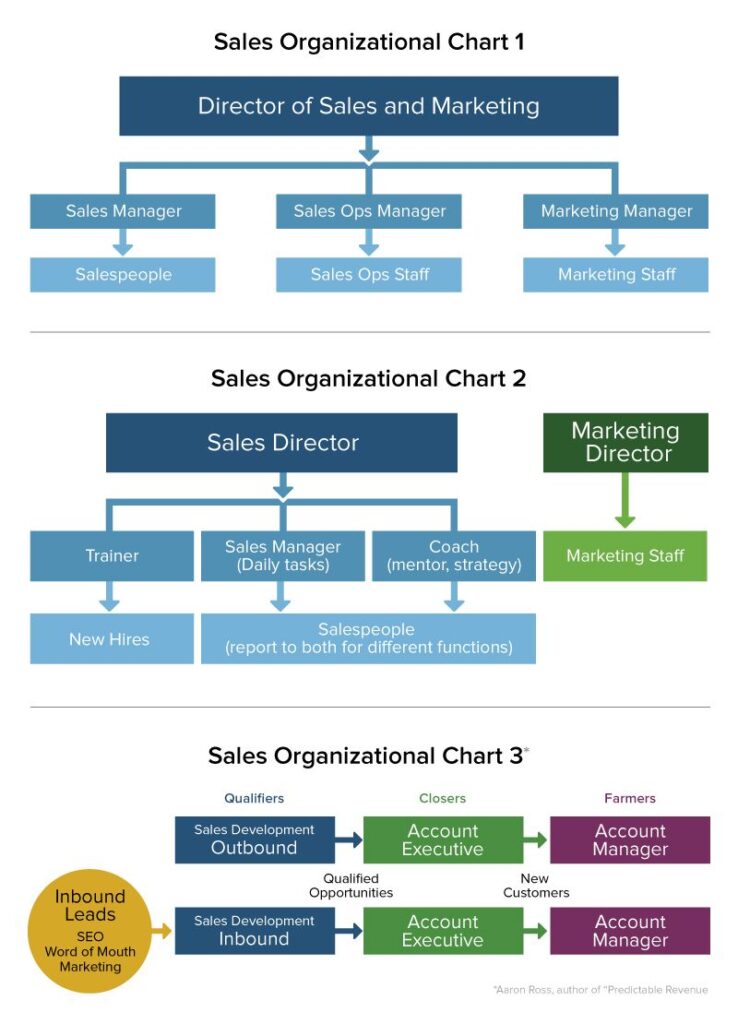Roles & Responsibilities

- Roles & Responsibilities
– SDR (engage, qualify, set appt)
– Inbound sales (fielding incoming sales opps remotely – can focus on all or part of sales process given sale size, complexity and team roles)
– outbound sales (initiates sales opps via outreach, typically remotely – can also focus on all or part of sales process)
– field sales (focus on developing and closing sales opps in client or third party locations)
– sales execs (demonstration through closing of sales)
– sales engineers (focus on tailoring solutions for clients in the middle and bottom of the deal funnel)
– onboarding reps (focus on the client onboarding process)
– account managers (focus on ongoing management and expansion of client accounts)Managing roles:
– team leads (player-coach, contributing team members who also provide management, leadership and training for younger reps)
– managers (manage full or specialized teams)
– leadership (focus on strategy, programs, team leadership and executive reporting)
– non-sales executives (executives with non-sales pedigrees or holding non-sales offices that manage sales roles)At the strategy level, this can detail the current roles and responsibilities, the tuned roles and resp, and the next phase of scaling. Details of the roles should live in the staffing playbook and cascade into the JDs, etc
ℹ️ Information
Why this is important
Why is defining sales rolls & responsibilities important?
Defining sales roles and responsibilities is essential for a sales organization for several crucial reasons:
- Clarity and Focus: Clearly defined roles and responsibilities provide clarity on individual and team expectations. Sales professionals understand their specific duties, which helps them stay focused on tasks that align with their expertise, ultimately contributing to improved performance and productivity.
- Efficiency and Productivity: When each team member knows their role and responsibilities, tasks are executed more efficiently. This reduces redundancy, minimizes confusion, and streamlines processes, leading to increased overall productivity within the sales organization.
- Specialization and Expertise: Different sales roles often require specific skills and expertise. Defining roles allows for specialization, where team members can develop deep knowledge and proficiency in their assigned areas. This specialization enhances the quality of work and contributes to better outcomes in each stage of the sales process.
- Effective Collaboration: Clear delineation of roles fosters effective collaboration among team members. When everyone understands their responsibilities, collaboration becomes smoother, and team members can work together seamlessly to achieve common goals. This collaboration is essential for tackling complex sales challenges and closing deals successfully.
- Accountability: Defined roles and responsibilities create a framework for accountability. Team members are held responsible for specific tasks and outcomes, making it easier to assess individual and team performance. Accountability is crucial for maintaining high standards and driving continuous improvement.
- Optimized Resource Allocation: Understanding the roles and responsibilities of each team member allows for the optimized allocation of resources. This includes assigning tasks based on individual strengths, ensuring that the right people are handling the right aspects of the sales process, and maximizing the overall efficiency of the sales team.
- Enhanced Customer Experience: When roles and responsibilities are well-defined, sales professionals can focus on delivering a more consistent and high-quality customer experience. Clear responsibilities ensure that customers receive the right information and support at each stage of the sales journey, leading to increased customer satisfaction and loyalty.
- Adaptability to Change: In a dynamic business environment, roles may need to adapt to changes in market conditions, technology, or customer preferences. Clearly defined roles make it easier for organizations to identify necessary adjustments and implement changes effectively, ensuring continued success in evolving circumstances.
- Training and Development: Defined roles provide a foundation for training and development programs. Sales organizations can design training initiatives that align with specific roles, helping team members acquire the skills and knowledge required for their responsibilities. This ongoing development contributes to the overall growth of the sales team.
In conclusion, defining sales roles and responsibilities is fundamental to the success of a sales organization. It promotes efficiency, accountability, collaboration, and adaptability, ultimately contributing to improved performance, customer satisfaction, and business success.
